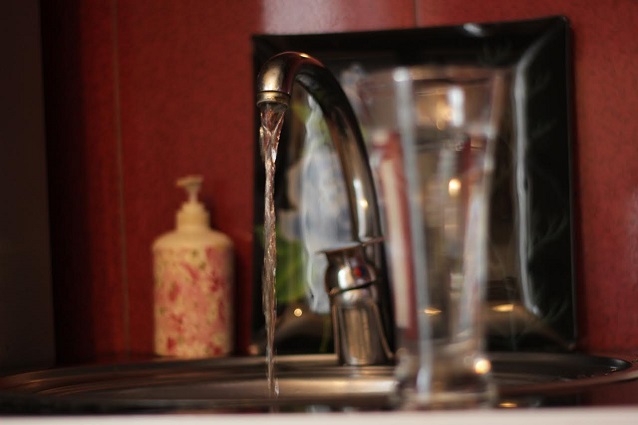Working to achieve a clean water supply for all


Irma Bregadze lives in Tkibuli, a town on the northern edge of Imereti region, a coal-mining centre 235km north-west of Georgia’s capital Tbilisi. Like Tkibuli’s other 12,000 residents, her family struggles for access to a constant and safe supply of tap water – all the homes in Tkibuli receive tap water for less than 4 hours per day. Thus, residents of the town have to be dependent on spring water falls and wells.
The key problems facing Tkibuli’s water management is the out-dated and severely run down infrastructure, suffering from underinvestment and inadequate maintenance.
The situation only improved a month ago, when Bregadze’s family and her neighbours started to receive tap water for more than 8 hours per day, a result of the ongoing Water Infrastructure Modernisation II project, funded by the European Union, in particularly with a Neighbourhood Investment Facility (NIF) investment grant of EUR 8 million, and EUR 40 million from the European Investment Bank (EIB), which go towards supporting the refurbishment and upgrading of municipal water facilities in Georgia.

Irma Bregadze, a Tkibuli resident. Photo courtesy of Tamar Khurtsia.
"When we were turning on taps, the water was coming out the colour and taste of rust, because there were damaged water pipes, as well as because of problems at the water source where the drinking water originates,” Bregadze said.
"Rehabilitation work has just finished in our district of the town and the schedule of receiving the tap water has improved, but still we do not trust the quality of the water and for drinking we bring the water from nearby springs,” she added.

Tap water at Bregadze's home. Photo courtesy of Tamar Khurtsia.
Rehabilitation works for the Tkibuli drinking water supply system worth GEL 4.5 million, were launched this April, and will take up 22 months to implement. The Gamgebeli (local Governor) of Tkibuli, Robizon Gvenetadze, believes that once the rehabilitation works are complete, 90% of residents will have access to a constant supply of water.
"Tkibuli receives the drinking water from Shaori water reservoir (located in Racha, a highland area in western Georgia) and soon in the framework of this project we will manage to implement the modern technologies of water filtration to supply hygienically sound water,” said Zaza Zosiashvili, the Head of the Infrastructure Unit at the Municipality of Tkibuli.
In addition, the project will deliver a fully functioning water supply and wastewater disposal system in the town.
The Water Infrastructure Modernisation II project, which builds on the work of an earlier phase of the project, aims to maintain the continuity of the water supply, reduce leakages in the water supply system and improve water quality across 23 cities in Georgia by 2018.

Water purification system in Racha, eastern Georgia. Photo courtesy of Tamar Khurtsia.
The Municipal Development Fund of Georgia, a government body responsible for strengthening the institutional and financial capacity of local government units, is implementing the project. Tea Garibashvili, a Project Manager from the Fund, said that currently 16 rehabilitation projects have been implemented in 17 cities across Georgia, Akhmeta, Lagodekhi, Sagarejo, Telavi (Kurdghelauri village), Tkibuli, Zestafoni, Abasha, Khobi, Senaki, Qareli, Tsalka, Bolnisi, Likani, Tsagveri, Dusheti, Sighnaghi and Tsnori.
Meanwhile, six cities have already benefitted from the project, including Gurjaani, Oni, Akhaltsikhe, Aspindza, Tetritskaro and Ozurgeti.
"Oni is the only city in the framework of the project where 100% of the population receives drinking water 24 hours per day. In other cities, there is still a daily schedule,” Garibashvili said.

Water reservoirs in Racha, western Georgia. Photo courtesy of Tamar Khurtsia.
Makvala Berishvili, from Oni, a town in a highland province in western Georgia, who runs a family hotel,confirmed that they are now receiving a reliable supply of water.
"I run a family hotel in Oni and there was a period when we were receiving the tap water only for a few hours per day. For the development of a small hospitality business, it is essential to have normal living conditions for the guests. If you do not have water or electricity in the modern age, tourists will not come. This business is the only income for my family and if I did not have it, our social and economic condition would be worse,” she said.
Garibashvili said the project would contribute greatly to the rural populations’ social and economic development.
"We welcome the European Union’s efforts to contribute to the regional development of the country by financing vital projects that aim increase the living standards of the citizens of Georgia,” she said.
More balanced and sustainable socio-economic development
Giorgi Kezherashvili, the Head of Division of Reforms and Innovations at the Ministry of Regional Development and Infrastructure highlighted the EU’s role in Georgia’s regional development, in the framework of the Regional Development Programme - Phase I and II, which was launched in 2011 and 2014 respectively. One of the main instruments for implementing the policy is "2015-2017 Regional Development Programme”, which is based on, and largely in line with, the EU Cohesion Policy experience of recent decades, aimed at the reduction of disparities between regions. This policy was significantly strengthened in the 1990’s to provide assistance to weak member states and later was applied to meet the needs of new member states.
In the 2015-2017 years period around GEL 3.7 billion will be spent for 5 main priority objectives:
- Improvement of physical infrastructure and environment protection;
- Supporting the development of small and medium enterprises and the creation of new jobs;
- Rural development;
- Tourism development;
- Improvement of human capital and development of vocational education institutional capacity at national and sub-national levels.
The latest report on Regional Disparities in Georgia finds that there is ahuge degree ofdisparities between urban and rural areas, and between Tbilisi and the other regions.
It is important that Georgian regions emerge as key players for determining overall national success given that the main drivers of growth and development arise exactly at regional and local levels.According to Kezherashvili, the "2015-2017 Regional Development Programme”will support the Georgian government in creating a favourable environment for the socio-economic development of the country, and for its territorial entities to overcome regional disparities and significantly increase their competitiveness.
 Tweet
Tweet  Share
Share